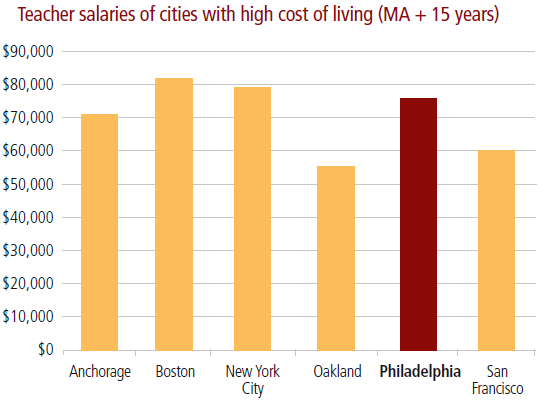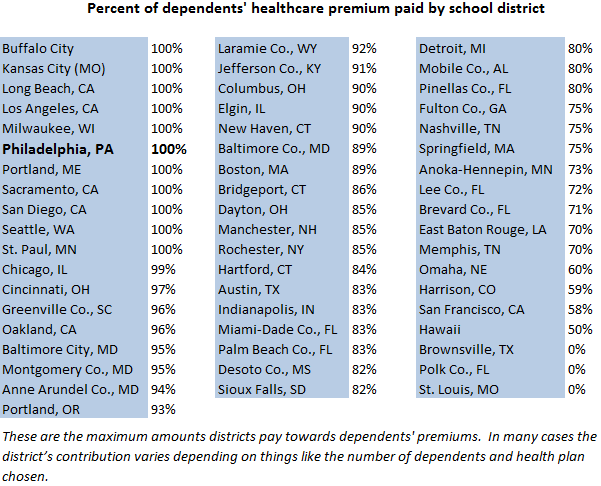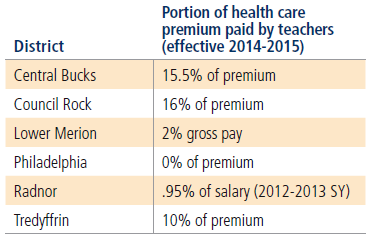September 2013
Welcome to Tr3 Trends, NCTQ’s monthly
newsletter designed just for school district officials (subscribe here). Each month we use data from NCTQ’s Tr3 database to highlight the
latest trends in school district policies and collective bargaining agreements
nationwide. Tr3 contains teacher policies from 114 school districts,
including the 50 largest districts, the largest district in each state, Broad
Prize winners, Gates investment districts and members of the Council of the
Great City Schools. Teacher policies from all 50 states are
also included.
Last year around this time we
reported on the teacher strike in Chicago. Now we turn our attention to Philadelphia, which has seen its share
of labor strife this year. A major budget shortfall, a tight-fisted governor and
a reform-minded superintendent set the stage for a showdown at the bargaining
table.
In this issue of Tr3 Trends we take a look at a few of
the major issues on the bargaining table in Philadelphia and how the district
and union proposals stack up against policies in other districts. Here’s what we found:
NEGOTIATION POINT: The School District of Philadelphia
is asking teachers to take a pay cut of up to 13% of their current
salaries. The union has agreed to retract their proposal for cost-of-living
raises, but will not accept pay cuts.
THE FACTS: While Philadelphia’s salaries for
mid-career teachers are competitive with those of other high-cost cities, they
are lower than those in surrounding school districts.



Click here
to compare teacher salaries in all 114 districts we track.
NEGOTIATION POINT: The school district is asking
teachers to pay part of their health care premium as currently the district
pays 100 percent for both teachers and their dependents. The union has said it
will agree to contributions to their premiums, but the exact amount is up for
negotiation.
THE FACTS: Only 20% of the 55 districts for which we
have healthcare data pay 100 percent of premiums for both teachers and their
dependents. In school districts surrounding Philadelphia, teachers must pay at
least part of their healthcare premium.



NEGOTIATION POINT: Philadelphia
school officials want teachers to work an 8-hour day. The current workday is about 7 hours.
THE FACTS: Nearly 80% of the districts we track
have a longer workday than Philadelphia.

Big-city districts that have teacher workdays of 8 hours or longer
include Denver, Atlanta, Dallas, Long Beach, and Mesa.
Teachers in Washington, D.C., Nashville, Portland (OR), and Oklahoma City work 7.5 hour days.
To compare teacher workday lengths in all 114 districts in our database, click here.
NEGOTIATION POINT: Philadelphia
laid off 676 teachers in June because of budget cuts and is recalling teachers as
funding allows. Typically state law says those teachers must be recalled as
they were laid off, using seniority.
However, Philadelphia’s School Reform Commission has temporarily suspended
this section of school code allowing for more flexibility in recalling teachers
in Philadelphia. The district’s initial bargaining proposal also includes
language allowing layoff and recall rules to be set by the superintendent.
THE FACTS: In 76% of the
districts we track that recall laid off teachers, teachers are laid off and
recalled by seniority. Only 21% of the
districts base layoff and recall decisions primarily on performance.

School districts in Florida, such as Miami-Dade, Hillsborough, and Broward,
layoff and recall teachers by performance, as do Wichita, Cincinnati, and Caddo and East Baton Rouge parishes in Louisiana.
Click here
to see the teacher layoff and recall policies in all the school districts we
track.
Read more
about the School District of Philadelphia’s human capital policies in our in-depth report
released in May 2013.
Go to Tr3’s custom report page to access all the data we use in Tr3 Trends and to
compare teacher policies in 114 school districts nationwide. Send feedback to gmoored@nctq.org.
